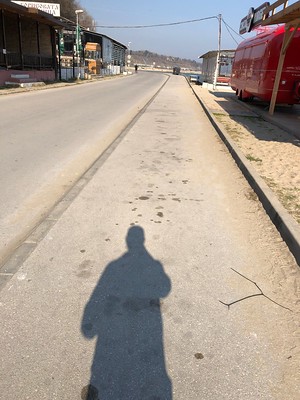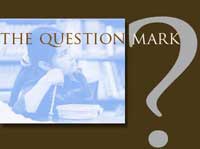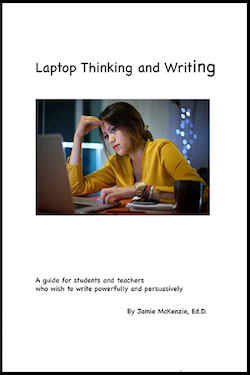|
Should you wear a mask?
It is the question of the day, with the World Health Organization still arguing against the general public wearing masks while some nations are mandating them and news organizations like CNN and The New York Times are running stories with titles suggesting a shift in strategy: "Asia may have been right about coronavirus and face masks," "Why Telling People They Donít Need Masks Backfired" and "The Mask Fiasco."
This journal has always advocated independent thinking when it comes to the important issues of life -- the all important, life-altering essential questions. This becomes especially important when there is much disinformation, distortion and conflicting advice. It turns out that experts can be wrong and pundits on news programs can be even more wrong.
Not being a medical expert, I will not be offering advice -- just pertinent questions, thoughts and information resources that the reader might find helpful. It is best for you to make up your own mind based on facts and evidence.
The White House is debating whether or not to suggest that everyone wear masks of some kind, with the President weighing in with his own suggestions:
He repeated his assertion that fabric coverings like scarves would be preferential, both because they avoid use of medical-grade masks needed in hospitals and because of their thickness.
"In many ways, a scarf is better. It's thicker," he said.
Do what you're told!
If your state, your city or your national government mandates masks in public, then your decision is fairly simple. You must comply. At the same time, you may still have some choice as to the type of mask you wear, ranging from commercially available masks to the homemade variety. That is a choice that may have consequences you should weigh carefully.
Are homemade masks more or less effective in protecting you and protecting others than the commercially available medical-grade masks?
I could not find clear research-based data to answer that question conclusively. In "Should I Make My Own Mask?" Tara Parker-Pope -- the editor of Well, The Timesí consumer health site, quotes a number of people, none of whom have robust evidence about the effectiveness of homemade masks, but all of whom seem to indicate that even thin homemade cloth masks are better than nothing when shopping or spending time close to other people.
We need more studies like this one: "Testing the Efficacy of Homemade Masks: Would They Protect in an Influenza Pandemic?" from the Society for Disaster Medicine and Public Health, Inc. But please note that the sample size was just 21 volunteers, and yet some are trying to cite it to justify national policies.
Results
The median-fit factor of the homemade masks was one-half that of the surgical masks. Both masks significantly reduced the number of microorganisms expelled by volunteers, although the surgical mask was 3 times more effective in blocking transmission than the homemade mask.
Conclusion
Our findings suggest that a homemade mask should only be considered as a last resort to prevent droplet transmission from infected individuals, but it would be better than no protection.
"The surgical mask was 3 times more effective in blocking transmission than the homemade mask."
Think about that! Small sample size but strong statement. Also the study was conducted in 2013 with two microorganisms, neither of which was COVID-19, so it does not actually speak to how COVID-19 might penetrate these same masks.
Recommendations about mask-wearing by the general public seem heavily influenced by agencies trying to protect the supply of effective masks for front line health workers. Homemade masks seem like stopgap measures in the face of inadequate supplies of surgical masks.
It is likely that even a national recommendation to wear face masks would create a mammoth public demand for the medical grade masks and magnify the shortage of these masks for medical personnel, unless the government did something dramatic to increase supply, a challenge it has not been able to meet very successfully with either tests or ventilators. In hoping to block transmission of the virus, urging the public to wear masks might actually endanger the safety of medical personnel.
In her article,
"Face masks could be part of the answer" Jennifer Lee (a CNN medical analyst and a clinical associate professor of emergency medicine at The George Washington University) argues for widespread use of masks:
Since we don't have enough face masks, we absolutely have to prioritize providing masks to those with the highest risk of infection, such as health care workers and first responders. But we, as a nation, should also be honest about whether the current guidance for healthy citizens not to use masks in public is really supported by the science or is just an attempt to prevent panic-buying and to preserve a limited resource for high risk groups.
The reality is that the proper use of face masks by citizens when they are in public spaces can benefit public health.
And what would happen to public health if panic buying by the general public cut off the supply of medical-grade masks to hospital workers?
Be wise, stay home and be safe!
While respecting firm rules, each person must make up their own mind about the masks based on their reading of the facts. Sadly, the facts regarding the efficacy of homemade masks are extremely limited.
And what is happening to the price of masks? The New York Times reports that profiteering is abundant. "Profiteers and Pool Noodles: The Mask Market Is a Total Mess"
 |
Social distancing remains an indisputable method of avoiding the virus. If you stay home and avoid people, you radically reduce the risk of exposure or transmission. At the same time, everyone needs to do some shopping and maybe some exercising, so it is best to limit the visits to stores while exercising, if you must, at a considerable distance from other people. |
We wish all of you good health during these horrible times!
Let's pray for a swift end to this virus and a return to normal.
|
Copyright Policy: Materials published in The Question Mark may be duplicated in hard copy format if unchanged in format and content for educational, nonprofit school district and university use only and may also be sent from person to person by email. This copyright statement must be included. All other uses, transmissions and duplications are prohibited unless permission is granted expressly. Showing these pages remotely through frames is not permitted.
FNO Press is applying for formal copyright registration for articles. Unauthorized abridgements are illegal.
|
|



